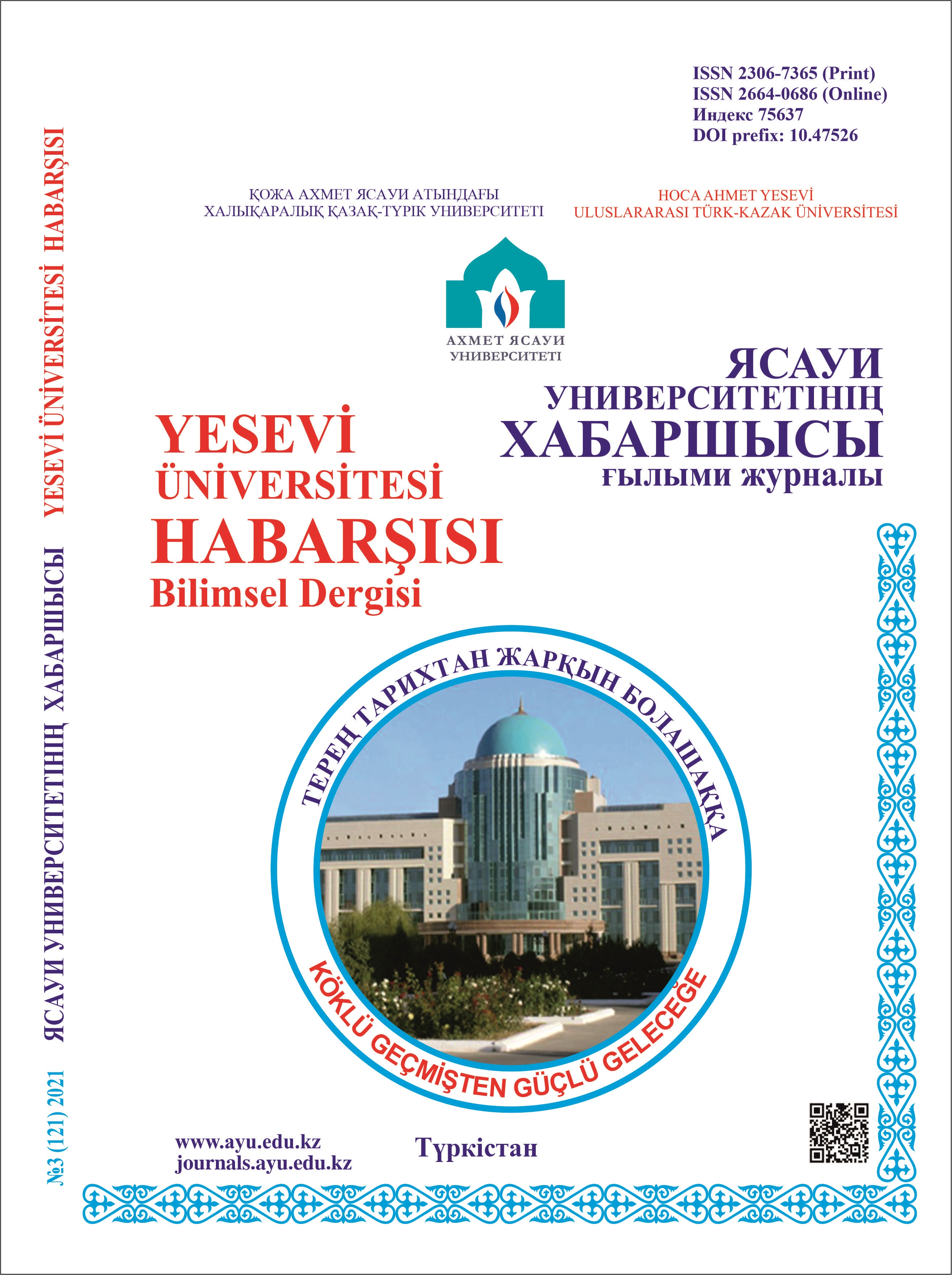«АТОМ ФИЗИКАСЫ» КУРСЫН STEM БІЛІМ БЕРУ НЕГІЗІНДЕ ОҚЫТУ ТИІМДІЛІГІН ЗЕРТТЕУ
205 172
Кілт сөздер:
атом физикасы, STEM білім беру, креативтілік, тәжірибе, оқыту тиімділігі, білім алушылар.Аңдатпа
Білім беру жүйесінде «Атом физикасы» курсын дәстүрлі түрде оқыту теориялық түрде терең оқытылса да, тәжірибе жүзінде қолданылуы жеткіліксіз болуы мүмкін. Білім алушылардың «Атом физикасы» курсын оқытуда STEM (ғылым, технология, инженерия және математика) әдістемесін қолдану арқылы курсты меңгеру тиімділігі артып, теорияларды тәжірибе жүзінде қолданып, нақты өмірде пайдалануды үйренеді. STEM негізінде оқыту өте өзекті, себебі бұл әдістеме арқылы білім алушылар атомдық және субатомдық процестерді тереңірек түсіне алады. Бұл зерттеу жұмысының мақсаты – «Атом физикасы» курсын STEM білім беру негізінде оқыту әдістерін талдау және білім алушылардың зерттеушілік қабілеттерін дамытудағы тиімділігін анықтау. Сонымен қатар, атом физикасын STEM білім беру негізінде оқыту білімінің сапасын арттырудағы әсерін анықтау. Әдеби шолуға PRISMA әдісі және әдебиеттердің нәтижелерінің тиімділігі мен сенімділігін анықтау үшін метаталдау әдісі қолданылды. Білім алушылардың «Атом физикасы» курсы бойынша STEM білім беру негізінде оқыту туралы көзқарасын анықтау үшін, жоғары оқу орнындағы білім алушыларынан сауалнама алынды. Сауалнама нәтижесіне математикалық-статистикалық талдау әдісі қолданылды. Гипотезаны тексеру G*Power бағдарламалық құралы арқылы жүзеге асырылды. STEM білім беру негізінде «Атом физикасы» курсын оқыту білім алушылардың осы курсқа деген қызығушылығы артты. Білім алушылардың креативті ойлау қабілеті және зерттеушілік қабілеттері тиімді түрде дамығаны байқалды.
Әдебиеттер тізімі
REFERENCES
Sulaeman N., Efwinda S., Putra P.D.A. Teacher readiness in STEM education: voices of Indonesian physics teachers // Journal of Technology and Science Education. – 2022. – Vol. 12, №1. – P. 68–82. https://doi.org/10.3926/jotse.1191
Liu Z.Y., Chubarkova E., Kharakhordina M. Online technologies in STEM education // International Journal of Emerging Technologies in Learning. – 2020. – Vol. 15, №15. – P. 20–32. –https://doi.org/10.3991/ijet.v15i15.14677
Fan I.Y.H., Shum W.K.F. Knowledge Management: The Missing Bonding Discipline of STEM Education // International Journal of Knowledge and Systems Science. – 2023. – Vol. 14, №1. – P. 1–8. https://doi.org/10.4018/IJKSS.323420
Roslina R., Samsudin A., Liliawati W. Effectiveness of Project Based Learning Integrated STEM in Physics Education (STEM-PJBL): Systematic Literature Review (SLR) // Phenomenon: Jurnal Pendidikan MIPA. – 2022. – Vol. 12, №1. – P. 120–139. https://doi.org/10.21580/phen.2022.12.1.11722
Oonsim W., Chanprasert K. Developing critical thinking skills of Grade 11 students by STEM education: a focus on electrostatic in physics // Rangsit Journal of Educational Studies. – 2017. – Vol. 4, №1. – P. 54–59.
Widayanti, Abdurrahman A., Suyatna A. Future physics learning materials based on STEM education: analysis of teachers and students perceptions // Journal of Physics: Conference Series. – 2019. – Vol. 1155. https://doi.org/10.1088/1742-6596/1155/1/012021
Kasianova G. Forming of technical thinking by STEM education of the future teacher of physics // Collection of Scientific Papers Kamianets-Podilsky Ivan Ohienko National University Pedagogical Series. – 2023. – №29. – P. 64–67. https://doi.org/10.32626/2307-4507.2023-29.64-67
Markus L. A needs analysis study in developing quantum physics instructional module for secondary school with an integrated STEM education approach // Borneo International Journal of Education (BIJE). – 2021. – Vol. 2. – P. 69–84. https://doi.org/10.51200/bije.v3i.4113
Lestarani D., Lalang A. C., Manggi I. Development of Articulate Storyline 3-based digital teaching materials on the subject of atomic structure and periodic elements system for SMA/MA students in Class X // Orbital. – 2023. – Vol. 15, №2. – P. 127–132. https://doi.org/10.17807/orbital.v15i2.17959
David H. A role for physicists in STEM education reform // American Journal of Physics. – 2015. – Vol. 83, №2. – P. 101–103. https://doi.org/10.1119/1.4904763
Jan K., Hevesi M., Krivicich L. M., Nho S. J. Meta-analysis // Translational Sports Medicine. – 2023. – P. 201–205. https://doi.org/10.1016/B978-0-323-91259-4.00041-2
Simmonds M. Quantifying the risk of error when interpreting funnel plots // Systematic Reviews. – 2015. – Vol. 4, №1. https://doi.org/10.1186/s13643-015-0004-8
Li G., Zeng J., Tian J., Levine M.A.H., Thabane L Multiple uses of forest plots in presenting analysis results in health research // Journal of Clinical Epidemiology. – 2020. – Vol. 117. – P. 89–98. https://doi.org/10.1016/j.jclinepi.2019.09.021
Murniati, Sofia, Sudirman, Aji D.P. Development of computer-based assessment instruments nuclear physics introduction course as an effort to grade authentically // Jurnal Penelitian Pendidikan IPA. – 2023. – Vol. 9, №7. – P. 5103–5110. https://doi.org/10.29303/jppipa.v9i7.4416
Bitzenbauer P. Development of a test instrument to investigate secondary school students’ declarative knowledge of quantum optics // European Journal of Science and Mathematics Education. – 2021. – Vol. 9, №3. – P. 57–79. https://doi.org/10.30935/scimath/10946
Nurhayati N., Boisandi B. Penggunaan modul berbasis konstruktivis pada mata kuliah fisika kuantum untuk meningkatkan penguasaan konsep ditinjau dari kemampuan matematik mahasiswa // Jurnal Penelitian & Pengembangan Pendidikan Fisika. – 2015. – Vol. 1, №2. – P. 33–38. https://doi.org/10.21009/1.01206
Shi W. Z. The effect of peer interactions on quantum physics: a study from China // Journal of Baltic Science Education. – 2013. – Vol. 12, №2. – P. 152–158. https://doi.org/10.33225/jbse/13.12.152

